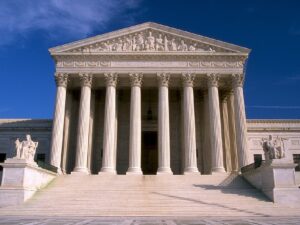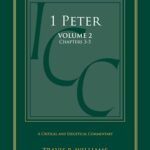How Can We Simultaneously “Submit to Every Ordinance of Man” and “Obey God Rather Than Men”?
The intersection of Acts 5:29 and 1 Peter 2:13 encapsulates a tension facing many churches today. Harmonizing these texts is not a simple task. Still, it can be done. The simplest harmonization goes something like this: “We must obey the government unless the government explicitly tells us to disobey God.” This is a good starting point for discussion, but the weeds get thick as we swim deeper. Note the following:
- As Calvin notes, there are “unlawful laws” that complicate the general rule—laws that in the final analysis are illegal (e.g., the High Priest’s command in Acts 23:2–3 that Paul be struck in violation of the command of God; cf. also Acts 22:25ff; 25:10ff). In such cases, the biblical pattern seems to be that one violates the law, then makes an appeal in the courts. In the American legal system this pattern has been normalized. American courts ordinarily do not hear cases until “standing” is established, and one of the more effective ways of securing standing is by breaking an offending law and incurring its penalties (e.g., the Scopes Trial). So if Congress passes an unlawful law that truly “prohibits the free exercise of religion,” there is, I think, biblical warrant for disobedience. It does not mean that we must disobey or that it is prudent to disobey, only that we may disobey. We should be warned, though, that if we do disobey and challenge the lawfulness of draconian laws, we risk the possibility of those laws being officially declared lawful and a matter of precedent, restricting the church still further.
Example: If President Trump issues an executive order that all pastors in America must preach a sermon series on 1 Peter 2, I do not need to obey him—even if obeying him does not require me to disobey God. And that’s because he has established an unlawful law, not only according to the American Constitution, but also coram deo.
- I allow that certain lawful laws may be (temporarily) suspended and that certain unlawful laws (temporarily) implemented in extraordinary circumstances for the common good; still, this exception is not absolute. Civil authorities may rightly suspend civic activities that are not essential for physical life and safety. This is their purview. They cannot, however, regulate ecclesiastical activities, because civil authorities are neither qualified nor authorized to assess what is essential/non-essential to spiritual life and safety. The government may believe that regular meetings for worship are nonessential, that meeting as a whole assembly is nonessential, that singing is nonessential, or that the Lord’s Supper is nonessential (and be correct so far as physical life, health, and safety are concerned), but a spiritual assessment is outside their jurisdiction. This is, in part, why we have the first amendment: the civil authorities are not qualified to regulate the spiritual/ecclesiastical realm. They can surely advise (and churches should duly consider their advice), but they cannot regulate; this privilege belongs to the church alone.
- That churches have not been “targeted” (Roberts’s opinion after noting that malls and restaurants have an apples-to-oranges relationship with churches in terms of assembly), misses the point. And that is because the church is protected in two ways by the First Amendment: generally in the safeguarding of peaceable assembly, and specifically in the safeguarding of religious exercise. While it is true that indoor concerts, banquets, and sporting events more closely approximate the physical dimensions of ecclesiastical assemblies, nothing on earth compares, apples-to-apples, with the spiritual dimension of ecclesiastical gatherings. Concerts, banquets, and ballgames are not religious exercises; the church is.
- This does not mean that the civil government cannot regulate material aspects of church life (building codes, zoning laws, etc.) that fall outside the boundaries of the regulative principle of worship. They can. They cannot, however, regulate in churches what God alone regulates. In terms of worship, assemblies must do all that God commands (and only what God commands, but that’s a topic for another day).
- The church can, furthermore, in extraordinary circumstances, make exceptions to aspects of regular religious praxis (cf., in principle, David’s receipt of permission from the priest to eat the showbread in 1 Sam 21). If a church decides, for instance, to suspend services temporarily or to exclude specific elements of worship for a time, it is, I believe, authorized to do so. But these exceptions are defined not by the state, but by the church.
- This brings me, lastly, to what I call the evangelical argument, that is, the argument that if the church meets and thereby incurs public disapproval, then the church’s public witness will suffer. There is something to be said for this argument. If a church, by meeting imprudently, demonstrably escalates the pandemic and contributes materially to the death of persons especially outside the church, this will diminish opportunities for the Gospel. And if this outcome is deemed likely, churches should do what they can to avoid it. But this sword has two edges. If, in fact, the church signals to the watching world that assembling for worship is dispensable, if we quickly abandon the assembly in the face of hardship or risk, or if we are slow to reassemble afterward, our witness to the world suffers on that account too.
We Protestants do not believe that failure to participate in certain aspects of ecclesiastical ritual will lead to the loss, once possessed, of our spiritual life (like, say, Romanists do). Still, it is wrong to suggest that assembling, the public reading of Scripture, the sermon, corporate prayer, the singing of psalms and hymns, participation in the Lord’s Table, etc., are dispensable or that they communicate no grace at all. We do all of these things because our spiritual health hinges in no small degree upon them. And we do ourselves an apologetic disservice when we suggest otherwise, whether implicitly or explicitly. We may be able to survive indefinitely in a physical sense without the regular elements of gathered worship, but in terms of spiritual vitality, they are more essential than food itself.
To conclude, then, it seems necessary to amend the statement, “We must obey the government unless the government explicitly tells us to disobey God,” to something like this: “We must obey the government (1) unless the government explicitly tells us to disobey God, or (2) unless the government exceeds its jurisdiction so as to speak authoritatively into a sphere regulated by another, God-instituted authority.”




Mark,
Thank you again for your clear insightfulness. I don’t know what you think on the exact position of Grace Community Church’s decision to not comply with their state’s executive orders, but it seems that it falls under your stated position.
I have heard the criticisms lobbied at MacArthur/GCC by well-respected church leaders (Dever, et al). The criticisms seem to be limited to the manner of church practice, such as GCC could comply with the governor’s order and hold worship meetings outdoors rather than indoors. These leaders criticized the merits of the practice than judge the merits of the principle behind GCC’s stance. However, it seems that the criticisms have the missed the point that the civil authorities do not have the authority to regulate spiritual practices of and within the church mandated by the Scriptures. Dever’s church find themselves at the same crossroads of compliance v noncompliance for which they criticized MacArthur & the elders of GCC. Capitol Hills Baptist is suing DC mayor for their limits of attendance for outdoor services.
https://www.christianpost.com/news/capitol-hill-baptist-sues-dc-mayor-over-ban-on-outdoor-worship-with-over-100-people.html
The bottom line seems to be that pastors may find this difficult territory to negotiate. We live in an age of incrementalism and Hegelianism where the enemies of the cross are careful to move goal posts consistently and ever so slowly to bring restrictions to the church and individual Christians. The question is at what point in this process does the church say enough is enough when considering both the Scripture and the Constitution? We have to be very careful in judging how pastors handle this.
David Diez: Agreed. And yet TGC publicly disapproves of MacArthur/GCC’s approach but now publicly approves of Dever/CHB’s (with no effort to explain the inconsistent treatment).